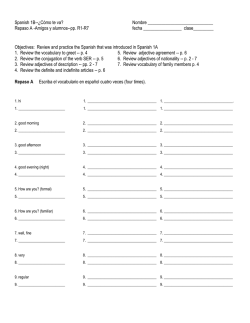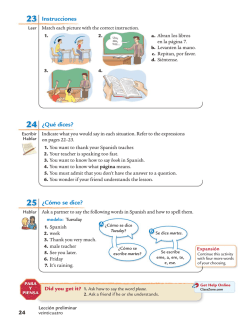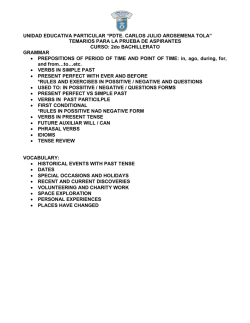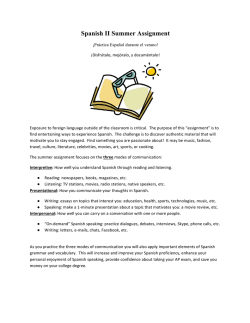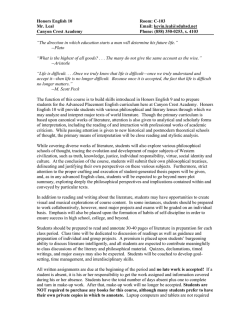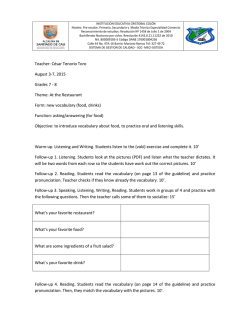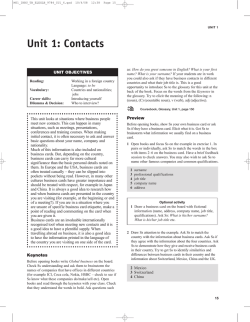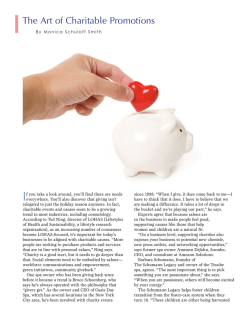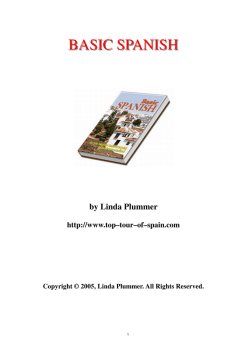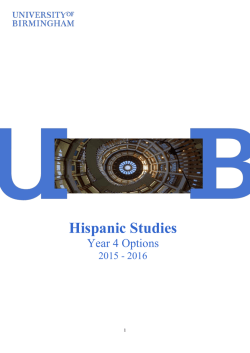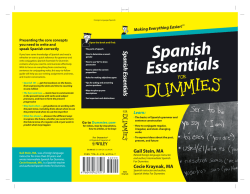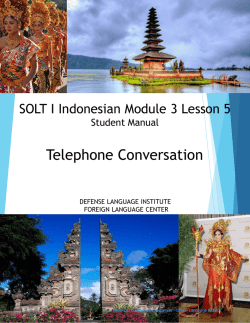
Spanish 131 Spring - Stephen F. Austin State University
Stephen F. Austin State University Department of Languages, Cultures and Communication Elementary Spanish 1-- Spanish 131 Spring 2015 Instructor: Ms. Kelsey Treusdell Contact: [email protected] Class meeting: SPA 131.002 MWF 8:00- 8:50 am SPA 131.004 MWF 9:00-9:50 am SPA 131.008 MWF 11-11:50 am Ferguson 173 Ferguson 173 Ferguson 174 Office phone: (936) 468-2600 Location: Liberal Arts North 253 Office Hours: MWF 10-11 am, TR 8-9 am and by appointment Texts: (required) Vistas, 4th Edition Authors: Blanco and Donley Publisher: Vista Higher Learning Description: Spanish 131 serves as the foundation of the first-year Spanish program at SFASU. It is designed to help students develop skills in speaking, reading, writing and listening comprehension in Spanish, and provide them with a better understanding and appreciation of Hispanic cultures. Even though this is an introductory course, class work will be in the target language in order to facilitate and encourage the students’ interest in becoming fluent in Spanish. This course will present grammatical structures, vocabulary and cultural knowledge necessary for effective communication in the target language. Organization: This course will cover lessons 1-6 in the textbook Vistas. Attendance: Attendance is mandatory. You are allowed 3 “free” absences to use at your discretion; if you exceed the 3 absences you must provide documentation in order for them to be excused. If you are absent it is your responsibility to keep up with assignments and material covered. Spending class entirely off-task (i.e. with headphones on, texting throughout class, or sleeping) will result in being counted absent. Tardiness and Disruptive/Disrespectful Behavior: Students are expected to come to class on time and prepared. Three instances of significant tardiness (10 minutes or more) will count as an absence. Likewise, repeated instances of disruptive or disrespectful behavior (repeatedly and blatantly ignoring instruction, being rude to instructor or classmates, etc.) will result in a 0 for that day’s work. Homework: To learn a language, the most important key is consistency and practice, so we will have frequent homework that you are expected to complete on time. Late work, as a rule, is not accepted. If you need help, come by the office! Quizzes: Expect short weekly quizzes throughout the semester covering material we have practiced that week in class. These will usually be given at the beginning of class on Fridays. As a rule I will not give make-up quizzes, since I return these as soon as possible after we finish them to go over them. Your lowest 2 quiz grades will be dropped at the end of the semester. Conversation Days & Oral Exam: We will have “conversation days” throughout the semester where we will not study grammar, but focus on conversation the whole class period. You will earn a participation grade on these days. You will also practice and record a conversation with other classmates towards the end of the semester. I will put you into groups a few days before the oral quiz and give you possible topics to practice. On quiz day, you will get into your groups in class and record your conversation which you will then send to me. Compositions: I will give you a couple of composition assignments that are to be written on your own in basic Spanish without the use of a translator or help from someone besides myself. (I cannot emphasize enough how very obvious it is when someone copies, uses Google Translate or gets a friend to help them! This will result in a zero for the assignment. Come see me for help!)You will also have a core assessment assignment for the end of the semester that you will submit through d2L. I will give you detailed instructions in class closer to time. Final Grade Calculation Grade type Conversation Days Compositions Homework Quizzes Exams 1 and 2 Final Exam A = 89.5 – 100 Percentage 5% 10% 20% 20% 30% (15% each) 15% B = 79.5 – 89.4 C = 69.5 D = 59.5 – 69.4 *Students must pass Spanish 131 with a 70 or higher to enroll in Spanish 132. Ultimately, you must show that you are prepared for 132 material upon finishing this class. Students with disabilities: If you have a learning or physical disability, visual or hearing impairment that might affect your progress in Spanish, please see me. To obtain disability related accommodations, alternate formats and/or auxiliary aids, students with disabilities must contact the Office of Disability Services (ODS), Human Services Building, and Room 325, 468-3004 as early as possible in the semester. Once verified, ODS will notify the course instructor and outline the accommodation and/or auxiliary aids to be provided. Failure to request services in a timely manner may delay your accommodations. For more information, go to http://www.sfasu.edu/disabilityservices/. General Education Core Curriculum Objectives/Outcomes: 1. To understand and demonstrate writing and speaking processes through invention, organization, drafting, revision, editing, and presentation. 2. To understand the importance of specifying audience and purpose and to select appropriate communication choices. 3. To understand and appropriately apply modes of expression, i.e., descriptive, expositive, narrative, scientific, and self-expressive, in written, visual, and oral communication. 4. To participate effectively in groups with emphasis on listening, critical and reflective thinking and responding. 5. To understand and apply basic principles of critical thinking, problem solving, and technical proficiency in the development of exposition and argument. Program Learning Outcomes: This is a general education core curriculum course and no specific program learning outcomes for this major are addressed in this course. Student Learning Outcomes: SPA 131 is part of the university’s Core Curriculum and as such strives toward both the general goals of the core and the specific objectives as a communication course designated for inclusion in the Component Area Option as defined by the Texas Higher Education Board. In addition to helping students develop skills in speaking, reading, writing and listening comprehension in Spanish, and providing them with a better understanding and appreciation of Hispanic culture, SPA 131 will also demonstrate the more general ability to: · Communicate effectively by developing and expressing ideas through written and oral communication. · Think critically, which includes the ability to analyze, evaluate, and synthesize information about the history, culture, family, and artistic production of the Spanish-speaking world. · Work as part of a team, by demonstrating the ability to consider different points of view and to work effectively with others, supporting a shared purpose or goal. · Understand the role that personal responsibility has played throughout history and gain the ability to connect choices, actions, and consequences to making ethical decisions. Assessment Assignment: To measure the success of student acquisition of these mandated skills, one assignment during the semester will require written and oral critical analysis of a film in the target language and selected readings, which will require that students think critically about the film and the historical background, examine how individual choices and decisions influenced the story, and consider the challenges faced by Latin Americans assimilating into U.S. culture. Completion of this assignment is required by the university and is an important component in the successful completion of this course. Further instructions will be provided at the appropriate time. Academic Honesty: Academic dishonesty, cheating and plagiarism will not be tolerated. All students in this class are expected to comply with university policies regarding academic honesty. Any student caught cheating will receive a grade of zero on the assignment and will be reported to the dean of his or her major school. All homework should be your own. This means that the use of online translation programs is not permitted (My edit: Besides, Google translate can also be misleading. Use wordreference.com!). Below is university policy: Academic dishonesty includes both cheating and plagiarism. Cheating includes but is not limited to (1) using or attempting to use unauthorized materials to aid in achieving a better grade on a component of a class; (2) the falsification or invention of any information, including citations, on an assigned exercise; and/or (3) helping or attempting to help another in an act of cheating or plagiarism. Plagiarism is presenting the words or ideas of another person as if they were your own. Examples of plagiarism are (1) submitting an assignment as if it were one's own work when, in fact, it is at least partly the work of another; (2) submitting a work that has been purchased or otherwise obtained from an Internet source or another source; and (3) incorporating the words or ideas of an author into one's paper without giving the author due credit. Spring 2015 Tentative Course Schedule We will adjust our schedule throughout the semester if needed, so listen carefully in class! 1-19 M Martin Luther King Day 1-21 W Chapter 1. Greetings, Introductions, Pronunciation 1-23 F Chapter 1. Greetings, Introductions, Pronunciation 1-26 M Chapter 1. Greetings, Introductions, Pronunciation, The verbs “ser” / “hay” 1-28 W Chapter 1. Nouns and articles, Numbers 1-30 F Chapter 1. Nouns and articles, Numbers, Telling Time 2-2 M Chapter 1. Question words. Telling time. Review. 2-4 W Chapter 2. School vocabulary. Days of the week. 2-6 F Chapter 2. Present tense –AR verbs. “Me gusta” 2-9 M Chapter 2. Present tense –AR verbs. Forming questions. 2-11 W Chapter 2. The verb estar and prepositions. 2-13 due. F Chapter 2. The verb estar and prepositions. Review. 1st mini-composition 2-16 M Review Chapters 1-2 2-18 W Chapter 1-2 Exam 2-20 F Conversation Day #1 2-23 M Chapter 3. Family vocabulary and possessive adjectives. 2-25 W Chapter 3. Descriptive adjectives and –ER verbs. 2-27 F Chapter 3. –IR verbs. Family vocabulary review. 3-2 M Chapter 3. Family vocabulary. Practice with verbs, tener, venir. 3-4 W Chapter 3. Chapter 3 Review. 3-6 F Conversation Day #2. 2nd mini-composition due. 3-9 M Chapter 4. Pastime vocabulary and the verb “ir” 3-11 W Chapter 4. Talking about the future with “ir,” “querer” 3-13 F Chapter 4. Pastimes, ir, Stem-changing verbs 3-16 M Spring Break 3-18 W Spring Break 3-20 F Spring Break 3-23 M Chapter 4. Stem-changing and other irregular verbs. 3-25 W Chapter 4. Chapter 4 Review and Practice. 3-27 F Chapters 3-4 Review. 3-30 M Chapters 3-4 Exam 4-1 W Conversation Day #3 4-3 F Easter Break 4-6 M Easter Break 4-8 W Chapter 5. Seasons, Months, Weather. 4-10 F Chapter 5. Vacation vocabulary. Ser vs. Estar 4-13 M Chapter 5. Vocabulary practice. Present Progressive 4-15 W 4-17 F Chapter 5. Direct object pronouns. 4-20 M Chapter 5 Review. 3rd mini-composition due. 4-22 W Chapter 6. Clothing and Colors. 4-24 F Chapter 6. Clothing and Colors. Saber vs. Conocer. 4-27 M Chapter 6. Shopping vocabulary. Saber vs. Conocer. 4-29 W Chapter 6. Shopping vocabulary. Indirect Object Pronouns 5-1 F Chapter 6. Shopping Vocabulary. Direct and Indirect Object Pronouns. 4-27 M Chapter 6. Preterite Tense. Demonstrative Pronouns. 4-29 W Chapter 6. Preterite Tense. Chapter 6 Review 5-1 F Conversation Day #4 5-4 M Final Exam Review 5-6 W Final Exam Review 5-8 F Conversation Oral Exam; Core Assessment Composition Due on LiveText 5-11 M Final Exams 5-13 W Final Exams 5-15 F Final Exams Chapter 5. Vocabulary practice. Ser vs. Estar
© Copyright 2026
